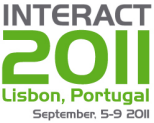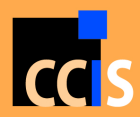INTERACT Workshop
September 6th, 2011, Lisbon, Portugal
organised by IFIP WG 13.2 "Human-Computer Interaction"
Introduction

Goals
The goals of this workshop are to provide HCI specialists, software engineers and usability specialists from industry and research institutions an opportunity to discuss both the state-of-the art and the cutting edge practices.
Participants
The workshop is the official workshop of IFIP working group 13.2 Methodologies for User-Centered Systems Design. It expects HCI specialists, software and usability engineers from academia and industry as participants.
Workshop activities and dissemination
Participants have to prepare a position paper of 4 to 10 pages which will be reviewed. Selected papers will be published on the workshop web site and will be presented during the workshop. The outcome of the workshop will be a white paper presented on the web site of the workshop.
References
- Chin, D.N., Empirical Evaluation of User Models and User-Adapted Systems. User Modelling and User Adapted Interaction, 2001(11): p. 181-194.
- Jacobson, I., Object- Oriented Software Engineering. A Use Case Driven Approach, Addison Wesley, 1992
- Jones, S., M. Jones, G. Marsden, D. Patel, and A. Cockburn, An Evaluation of Integrated Zooming and Scrolling on Small Screens. International Journal of Human-Computer Studies, 2005(65): p. 271-303.
- Kjeldskov, J. and C. Graham. A Review of Mobile HCI Research Methods. in Mobile HCI 2003 (Lecture Notes in Computer Science 2795). 2003. Udine, Italy: Springer-Verlag.
- Masthoff, J., The Evaluation of Adaptive Systems, in Adaptive Evolutionary Information Systems, N.V. Patel, Editor. 2002, Idea Group Publishing. p. 329-347.
- Obrist, M., Wurhofer, D., Beck, E., Karahasanovic, A., Tscheligi, M.: User experience (UX) patterns for audio-visual networked applications: inspirations for design. In Proc. NordiCHI(2010) p. 343-352
- Brusilovsky, P., C. Karagiannidis, and D. Sampson. The Benefits of Layered Evaluation of Adaptive Applications and Services. in Eighth International Conference on User Modelling (UM 2001). 2001. Freiburg, Germany.
- Gena, C., Methods and Techniques for the Evaluation of User-Adaptive Systems. The Knowledge Engineering Review, 2005. 20(1): p. 1-37.
- Kaikkonen, A., T. Kallio, A. Kekäläinen, A. Kankainen, and M. Cankar, Usability Testing of Mobile Applications: A Comparison between Laboratory and Field Testing. Journal of Usability Studies, 2005. 1(1): p. 4-16.
- Tamminen, S., A. Oulasvirta, K. Toiskallio, and A. Kankainen, Understanding Mobile Contexts. Journal of Personal and Ubiquitous Computing, 2004 (8): p. 135-143

